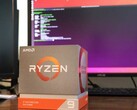Looks like AMD's new Ryzen 3000 chips excel at not just overclocking, but undervolting as well. Remember the Ryzen 7 3800X that managed a respectable 5.9 GHz overclock on LN2 at 1.1 V? While such high clocks at such a low voltage does raise eyebrows, theoretically this means that the new Ryzen CPUs can be made to run at high or rated boost clocks even with lower CPU Vcore values.
The AMD Ryzen 9 3900X is a 12-core 24-thread part with a base clock of 3.8 GHz and a boost of 4.6 GHz. Recently, there have been several reports of the Ryzen 9 3900X running at full speed at a Vcore of just 1.00V. Performance numbers were missing so far, though. LegitReviews set out find if it is really possible to have the same boost clocks even at lower Vcore and in the process, found that these reports were only partially true.
LegitReviews had access to a Ryzen 9 3900X on the Gigabyte Aorus X570 Master motherboard with 16 GB RAM running the F5g UEFI firmware. The CPU Vcore was changed from 'Auto' and dropped down manually to 1.20V, 1.10V, and 1.00V. Cinebench R20 was used to evaluate the effect of this undervolting on performance. There was no issue in booting the PC and surprisingly, HWiNFO64 showed that all 12 cores were running on 4.2 GHz across all the voltages. What this test proves, however, is that clock speeds alone do not dictate performance.
At 'Auto', the 3900X posted a score of 7,105 and coming down all the way till 1.00V, the processor managed a score of 5,490 — a performance deficit of 22.7%. Power draw at wall in 'Auto' was 216W while it dropped down by 35.6% to 139W at 1.00V Vcore. At 1.1V, the Ryzen 9 3900X just took a 16% performance hit for 28% less power, which is very impressive.
What we get to see here is that while the CPU does manage to run at 4.2 GHz across all voltages, the performance drops with drop in Vcore. So what could be the reason for lower performance at the same clocks?
One plausible explanation is that we are seeing some form of adaptive clocking at work here. That means, although the clocks appear to be the same, the CPU isn't working full time and is getting ready for the next cycle faster than before. However, thanks to the lower voltages, the processor now has more thermal headroom allowing it to boost better.
An explanation given by user The Stilt on Overclock.net offers some more info. What is basically being advocated is that when the CPU senses a lower voltage, it increases the VID request from the VRMs. When this voltage crosses a certain threshold, clock stretching occurs that causes decreased performance without change in clocks as reported by monitoring software.
What implications does this have in the real world? Well, lower cooling requirements due to lower power draws is one advantage not to mention some highly needed energy savings. Hypothetically, this also indicates that undervolted 12-core Ryzen chips could actually be used in a workstation laptop for some serious number crunching abilities. Don't quote us on that, though.


 Deutsch
Deutsch English
English Español
Español Français
Français Italiano
Italiano Nederlands
Nederlands Polski
Polski Português
Português Русский
Русский Türkçe
Türkçe Svenska
Svenska Chinese
Chinese Magyar
Magyar
















